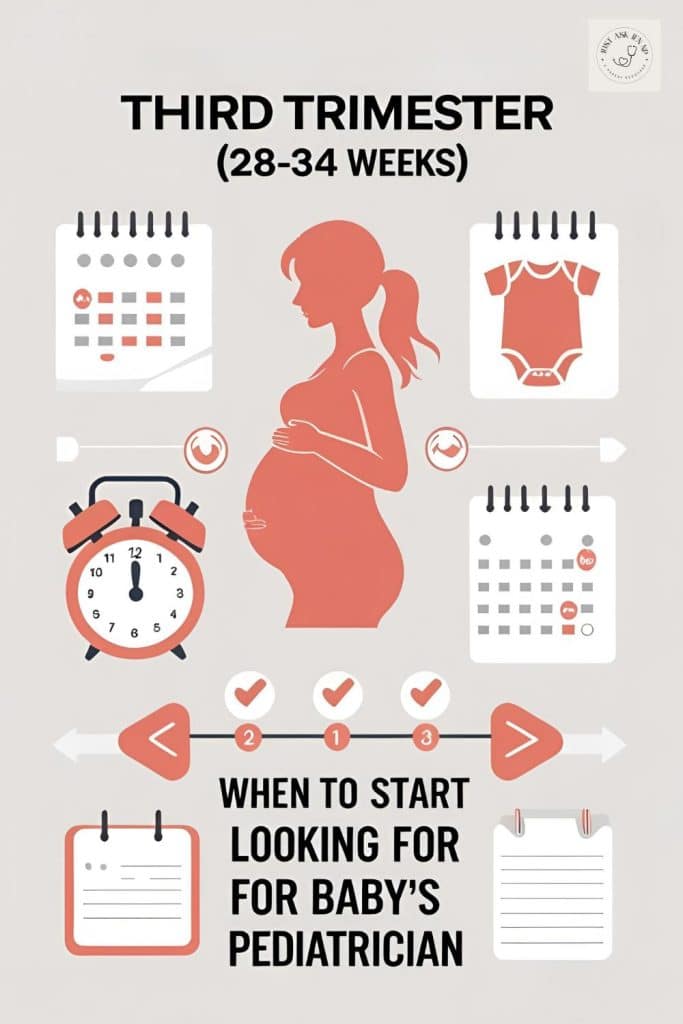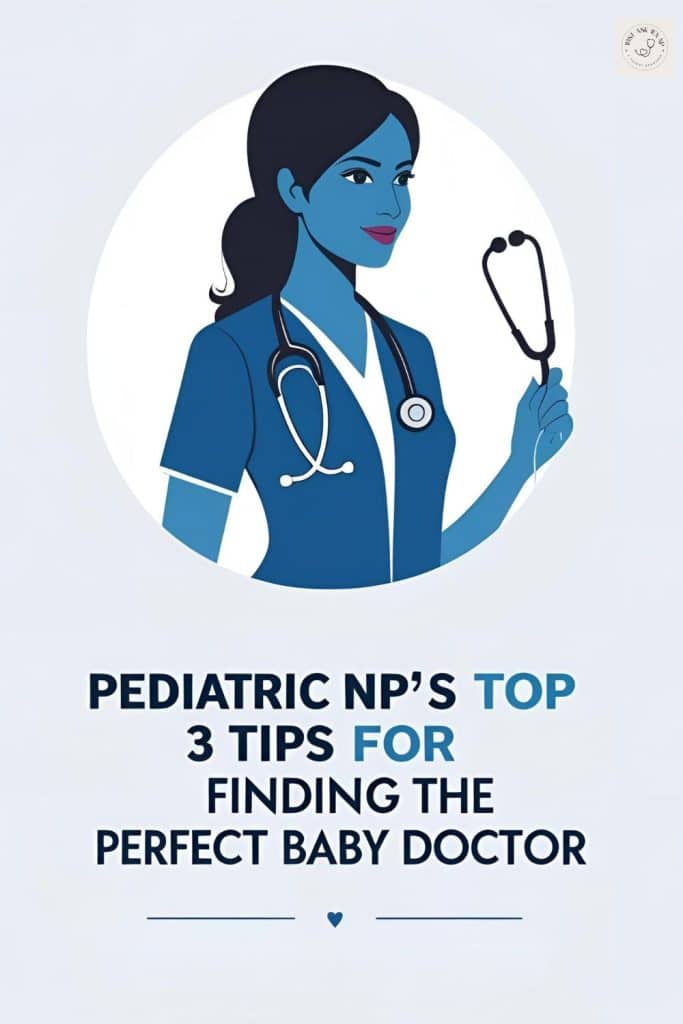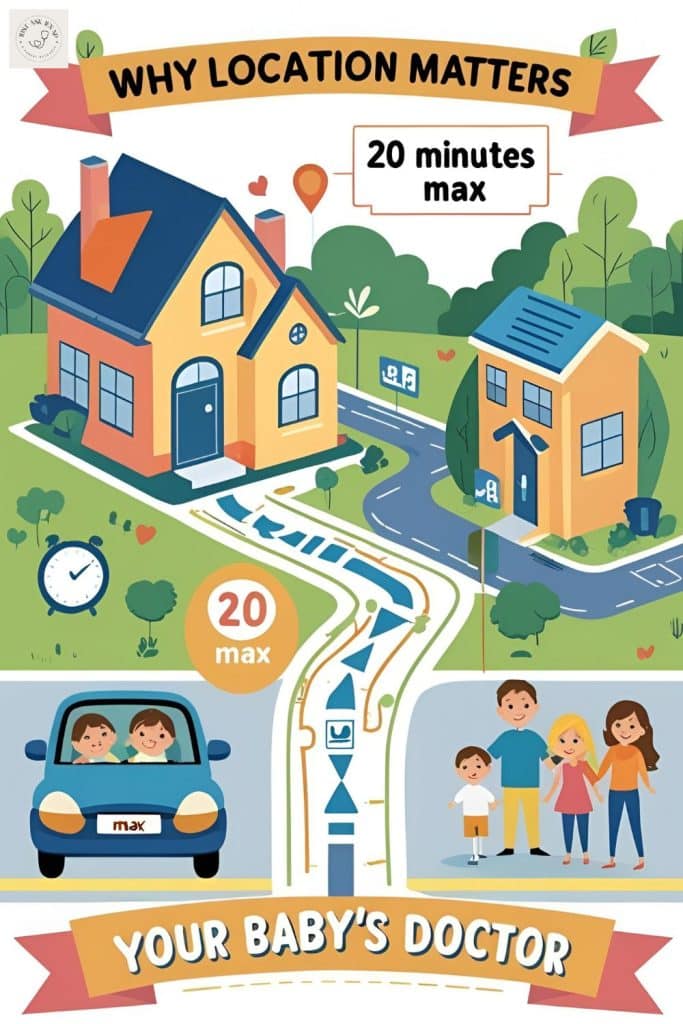How to Choose a Pediatrician (Before Baby Arrives): 8 Essential Questions Every Parent Must Ask

You’ve spent hours researching the perfect crib and comparing car seat safety ratings, but have you chosen the person who will guide your child’s health for the next 18 years?
If you’re like most parents, you’ve probably spent more time picking your baby’s stroller than selecting their doctor.
Yet this relationship will impact everything from breastfeeding success to vaccine decisions to how supported you feel during those middle-of-the-night health scares.
The right pediatrician becomes an extended member of your family—someone who celebrates your child’s growth, guides you through health challenges, and supports your parenting journey without judgment.
This guide reveals the 8 essential questions most parents forget to ask, the red flags that signal it’s time to find a different doctor, and exactly when to start this crucial search during pregnancy.
When to Start Your Pediatrician Search
The ideal time to choose your pediatrician is between 28-34 weeks of pregnancy. This timing is perfect because it gives you enough time to research, interview, and make a thoughtful decision before baby arrives, but it’s late enough that you’re focused on practical postpartum planning.

Many pediatric practices offer prenatal meet-and-greet appointments specifically for expecting parents. These consultations are usually free and give you a valuable opportunity to experience the office environment and assess the provider’s communication style before making your final decision.
Essential Factors to Consider When Evaluating Pediatricians
Location and Accessibility
Choose a pediatrician whose office is conveniently located near your home, workplace, or your child’s daycare. Consider factors such as:
- Distance from your home and work
- Accessibility via public transportation if needed
- Parking availability
- Office hours that work with your schedule
- Availability of evening or weekend appointments
Board Certification and Credentials
Ensure your potential pediatrician is board-certified by the American Board of Pediatrics. This certification indicates they have completed specialized training in pediatric care and passed rigorous examinations. You can verify credentials through your state’s medical board website or the American Board of Medical Specialties.
Hospital Affiliations
Consider which hospitals your pediatrician has admitting privileges at. In case your child needs hospitalization, you’ll want to ensure they can receive care at a reputable facility that’s convenient for your family.
Insurance Coverage
Verify that your chosen pediatrician accepts your insurance plan. Contact both your insurance company and the pediatrician’s office to confirm coverage and understand any co-pays or deductibles you’ll be responsible for. This would be a great place to start on your journey on how to choose a pediatrician.
The 8 Essential Questions Every Parent Must Ask
When interviewing potential pediatricians, these eight questions will reveal whether they’re the right fit for your family. Consider writing these down or taking notes during your consultations.
1. Which hospitals are you affiliated with?
Ideally, you want a pediatrician who has privileges at the hospital where you’ll deliver, so they can perform your baby’s first examination. This continuity of care is especially valuable during those crucial first days.
2. How quickly can sick children be seen?
A good answer includes same-day appointments for truly sick children. Also ask about their after-hours protocol—will you speak to a nurse, an on-call doctor, or be directed to urgent care? Understanding this process now will save stress later.
3. What lactation support do you offer?
Pediatrician support dramatically impacts breastfeeding success. Listen for specific answers about their training and resources, not just general encouragement. Ask if they work with lactation consultants or have staff trained in breastfeeding support.
4. What is your approach to the vaccine schedule?
Regardless of your personal views, you want their philosophy to align with yours. Whether that’s following the CDC schedule exactly or being open to alternative timing, make sure you’re comfortable with their approach and that they respect your preferences.
5. How do you approach antibiotic use for common childhood illnesses?
Listen for a thoughtful answer about appropriate antibiotic use, not automatic prescriptions for every ear infection. The best pediatricians practice evidence-based medicine and can explain their reasoning for treatment decisions.
6. What insurance plans do you accept, and what are typical out-of-pocket costs?
Healthcare finances matter, especially during the frequent well-visits of the first year. Make sure you understand not just insurance acceptance, but also costs for common services and procedures.
7. Will we always see you, or do you work with a team?
There’s no right answer here—some families prefer consistency with one provider, while others appreciate the flexibility of a team approach. The important thing is knowing what to expect and feeling comfortable with the practice structure.
8. How do you communicate with parents between visits?
Ask about patient portals, email access, nurse phone lines, and typical response times. Clear communication pathways will be crucial when you have questions or concerns between appointments.
Remember: Beyond these specific questions, pay attention to how the provider makes you feel. Do they rush through answers or dismiss your concerns? Or do they take time to explain their thinking and validate your questions? This communication style will matter tremendously when your baby is sick and you need support and guidance.
Red Flags: Warning Signs to Watch For

Be cautious if a potential pediatrician displays any of these concerning behaviors during your consultation:
- Dismissive attitude: They seem to rush through your questions or make you feel like your concerns aren’t valid
- Inflexible scheduling: Extremely limited office hours that don’t accommodate working parents or emergencies
- Vague responses: Can’t clearly explain their approach to common issues like sleep training, feeding challenges, or developmental concerns
- Overcrowded practice: The waiting room consistently looks chaotic with excessively long wait times
- Poor communication protocols: No clear system for after-hours concerns or non-emergency questions
- Judgmental behavior: Makes you feel criticized about your parenting choices or family decisions
Remember, you’re looking for a partnership. The right pediatrician views parents as the experts on their child while offering medical expertise and guidance without judgment. Trust your instincts—if something feels off during the interview, it’s likely to be a problem later when you need support and care for your child.
Three Practical Tips for Finding Your Perfect Match

1. Location Matters More Than You Think
During your baby’s first year, you’ll visit the pediatrician at least seven times for well-visits alone, not counting sick visits. Choose someone within 20 minutes of your home if possible. That short drive will feel much more manageable at 2 AM with a feverish baby or when you’re juggling work schedules for routine appointments.
2. Ask Local Parent Groups Strategic Questions
Don’t just ask parent groups “Who’s good?” Instead, ask specific questions like “Which pediatrician is most supportive of breastfeeding?” or “Who takes time to answer questions during visits?” These targeted questions will give you much more useful information about which providers align with your priorities.
3. Trust Your Instincts About Cultural Sensitivity
Your pediatrician should respect your family structure, cultural background, and parenting philosophy, even if they differ from their own. Pay attention to how they respond to information about your family and whether they demonstrate genuine respect for your values and decisions.

Getting Started with Your New Pediatrician
Once you’ve made your selection:
- Schedule your first appointment well before your baby’s birth or as soon as possible after switching
- Gather medical records from previous providers if applicable
- Prepare a list of questions about your child’s health, development, or any concerns
- Understand office policies regarding appointments, cancellations, and emergency care
- Get to know the office staff who will be assisting with your child’s care
Building a Strong Doctor-Patient Relationship
A successful relationship with your pediatrician requires effort from both sides:
- Be honest and open about your concerns and your child’s symptoms
- Come prepared to appointments with questions and relevant information
- Follow through on recommended treatments and follow-up appointments
- Communicate clearly about what works and what doesn’t for your family
- Respect their expertise while advocating for your child’s needs

Conclusion
The right pediatrician becomes an extended member of your family—someone who celebrates your child’s growth, guides you through health challenges, and supports your parenting journey without judgment.
Key takeaways to remember:
- Start your search between 28-34 weeks of pregnancy
- Schedule meet-and-greet appointments with at least three practices
- Ask the eight essential questions to assess fit and philosophy
- Trust your instincts about communication style and cultural sensitivity
- Pay attention to red flags during consultations
And if your first choice doesn’t work out? It’s completely okay to switch pediatricians. Your child’s health and your peace of mind are worth finding the perfect fit. The mistake many parents make is staying with a provider who isn’t meeting their needs out of convenience or guilt.
Remember that choosing a pediatrician is about finding a partnership that will support your family through the beautiful, challenging, and rewarding journey of raising healthy children. Take the time to find someone who truly feels right for your family—the investment in this relationship will pay dividends for years to come.
For more information, check out this link: https://kidshealth.org/en/parents/find-ped.html
For more tips on recovering from delivery, check out this post https://justaskjennp.com/postpartum-recovery/
